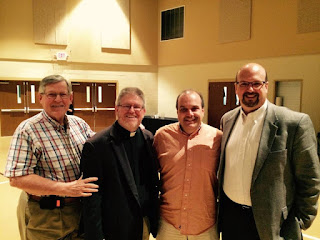 |
| Ircel Harrison, Joel Emerson, Phillip Moody, and Chris O'Rear |
Occasionally, I will come across notes from some professional
conference I attended years ago. Many of
these dealt with self-care and life/work balance. As I review those notes, I find that this has
always been a challenge for me. I assume
that it is for many of us in ministry.
How do we take care of ourselves and those about whom we care while
pursuing the demanding life of a minister?
This week I attended a conference sponsored by Mental
Health America of Middle Tennessee. My
friend, Chris O’Rear, who is executive director of the Pastoral Counseling
Centers of Tennessee, had the unenviable assignment of being the final speaker
of a worthwhile but day-long conference.
Fortunately, Chris’ presentation was worth staying to hear. He discussed the topic that never goes away—work/life
balance for clergy.
I won’t try to share in this post everything that Chris
said, but I do want to list the basics of self care he provided and make some
comments about each.
Healthy boundaries.
This is difficult for those in pastoral ministry especially when it
comes to family boundaries. The minister
wants his or her family to be a part of the congregation, but they are not on
staff nor should they be held to the same standards that a staff minister must
meet. Too often, both spouses and
children come to resent the church because of the demands made on both the
minister and themselves.
Healthy and open communication. Whether this is with significant others (such
a family members), co-workers or parishioners, clear and honest communication
must be nurtured and encouraged. What is
not said is as important as what is said.
Eating a healthy diet.
I think that many of us have come a long way on this. We realize that not everything has to be
fried in order to be eaten (unless one is at a state fair) and that we can say “No”
to certain things. Even so, this is
always a challenge.
Getting plenty of rest.
Another speaker at this conference talked about the four basics of our
physical lives—air, water, food, and sleep.
Sleep provides the opportunity for our brains to be renewed. If one has difficulty getting a good night’s
rest, he or she should consult with a trained professional.
Making time for exercise.
Again, everyone knows that this is needed, but we often need accountability
structures to assure that we do what is good for us. Even a brief period of exercise each day helps
build confidence, resilience, and health.
Cultivating our own spiritual practices. Do you study the Bible just for sermon
preparation or do you immerse yourself in Bible study, prayer, and other disciplines
for your own spiritual health? Such
practices are proven to be good not only for the soul but for the body as well.
Making time for hobbies and other interests. Leisure time activities not only refresh and
divert us but they feed our creativity.
We come back from such activities with new purpose and insights.
Easier said than done, you might say, and that is very
true. I do know that if a minister does
not practice these things on his or her initiative, not only will the ministry suffer
but so will relationships and personal health.
I once heard a pastor say, “I would rather burn out than rust out.” A better approach might be to stay well
tuned and maintained so that you can sustain your ministry for the long haul.
Thanks, Chris, for reminding us that self-care for the
minister is not a burden but an opportunity.
Comments